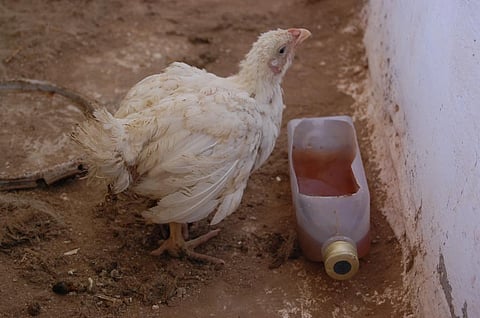Antimicrobial resistance: Madhya Pradesh’s action plan needs targeted and specific interventions
Antibiotics in food animals play a significant role in human health, making antimicrobial resistance (AMR) an essential environmental and public health issue. Madhya Pradesh’s action plan to deal with AMR needs specific interventions to succeed.
World Antimicrobial Awareness Week began November 18, 2022. It is a global campaign that is celebrated annually to improve awareness and understanding of AMR.
AMR represents one of the most important human- and animal health-threatening issues in developing countries like India. Antibiotic-resistant bacteria can be transmitted between humans and animals through contact, in food products and from the environment.
The prevalence of antimicrobial resistance among pathogens has increased during the recent decade. This is likely the result of selection pressure created by using antimicrobials in food-producing and pet animals. There is indiscriminate use of antimicrobials in the veterinary field.
Madhya Pradesh State Action Plan for Containment of Antimicrobial Resistance (MP-SAPCAR) was released at a stakeholder meeting in Bhopal July 26, 2019. MP became the second state in India after Kerala to develop an action plan to manage AMR.
The MP-SAPCAR focuses on a One Health approach to containing AMR through strategic priority areas and multi-sectoral involvement.
MP is the second-largest state in India with a considerable livestock population of 40.6 million and 16.7 million poultry. It also has a vast framework of 50 polyclinics, 1,012 veterinary hospitals and 1,583 veterinary dispensaries — all of which have a vast potential for antibiotic usage.
The veterinary department is rolling out its action plan on AMR containment by involving relevant stakeholders with an emphasis on restricting the use of antibiotics in livestock and poultry in various ways.
The department has taken several steps to identify district nodal officers and facilitating human resource development through information communication and education for field veterinarians, para-vets, farmers and the community.
Laboratories were strengthened for antibiotic sensitivity testing; the restriction of the over-the-counter sale of schedule H drugs (medicine that can not be bought without a prescription) and hospital bio-waste management was carried out.
Several other steps are yet to begin, like formulation of standard treatment guidelines; guidelines for prescription audits and quality improvement in veterinary infrastructure.
Monitoring government and private veterinary care units and dairy farms and strengthening infection prevention and control measures in veterinary institutes are also on their way.
The veterinary department is also placing emphasis on equipping laboratories with antibiotic sensitivity testing facilities so that farmers and animal owners get a confirmed antibiogram for the exact curative antibiotic, preventing them from following quacks.
Challenges in implementation
Implementation of legal regulations for the use of antimicrobials in food animals and availability of common treatment facilities for veterinary biowaste at the rural level are some of the major challenges to implementing MP-SAPCAR.
Monitoring antibiotic residue studies in animal products and establishing a state surveillance system for antimicrobial use in animal food are also significant hurdles.
The biggest challenge is the availability of sufficient manpower and funds for implementing AMR policy, which is a crucial requirement towards AMR containment goals. Budgetary allocation for the veterinary sector for time-bound AMR targets needs to be addressed.
The ground realities and challenges in the state need targeted and specific interventions. Identifying the leaders across the sectors is crucial. Once identified, their commitment to the cause is the sole reason for success.
Although the veterinary sector faces many challenges in developing and implementing MP-SAPCAR, strong support from policymakers and dedicated stakeholders can bring successful outcomes for AMR containment in the state.
Dr Jayant Tapase is an MVSc in pathology and works with State Animal Disease Investigation Laboratory, Jahangirabad, Bhopal.
Views expressed are the author’s own and don’t necessarily reflect those of Down To Earth


